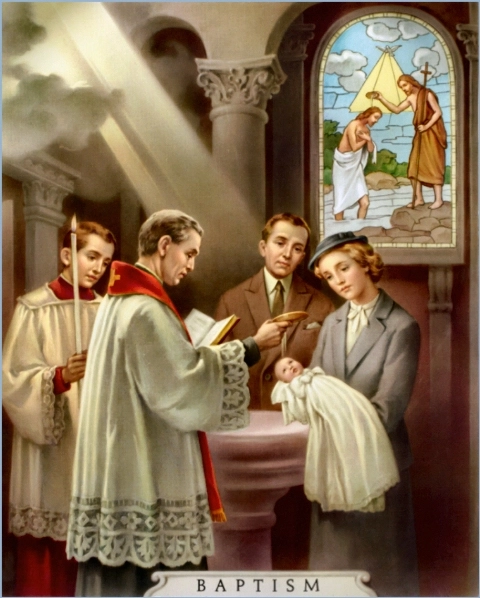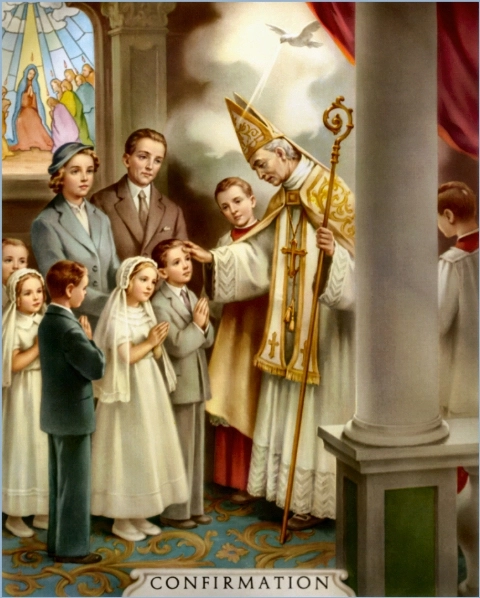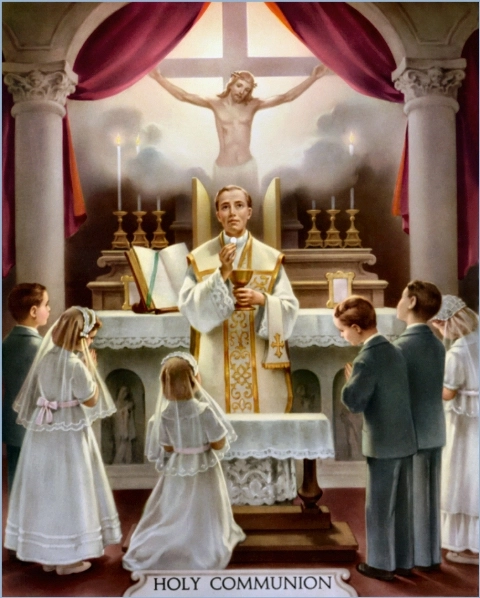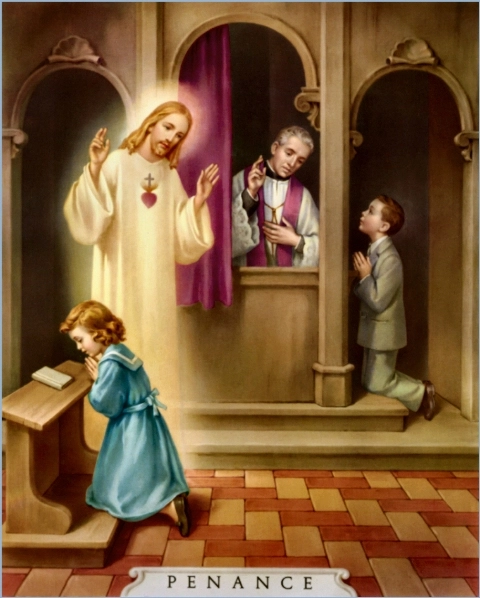Sacraments of the Catholic Church
The seven sacraments of the Roman Catholic Church are sacred rituals instituted by Christ himself, each conveying divine grace and marking important milestones in a believer's spiritual journey. They are central to the life of the Church, providing avenues through which Catholics encounter God's presence and receive his blessings. These sacraments not only strengthen individual faith but also foster communal worship and unity within the Church, embodying the ongoing relationship between God and his people through tangible signs of grace.

Baptism
Definition: Baptism is the sacrament by which a person is initiated into the Christian faith and becomes a member of the Church. It is the first sacrament of initiation.
Description: Baptism is rooted in Jesus' own baptism by John the Baptist in the Jordan River. In the Catholic Church, baptism involves the pouring or immersion in water (triple immersion or pouring), accompanied by the Trinitarian formula ("In the name of the Father, and of the Son, and of the Holy Spirit"). Baptism signifies the washing away of sin, both original sin inherited from Adam and personal sins, and the infusion of divine life into the soul. Through baptism, one is reborn as a child of God and becomes a member of the Church, the Body of Christ.
Sacramental Grace: Baptism confers the grace of justification, cleansing from sin, adoption as children of God, and incorporation into the Church.

Confirmation
Definition: Confirmation is the sacrament through which baptized persons receive the fullness of the Holy Spirit and are strengthened in their Christian life. It completes the grace of baptism.
Description: Confirmation is typically administered by a bishop and involves the laying on of hands and anointing with chrism (holy oil). The sacrament roots back to the Apostles receiving the Holy Spirit on Pentecost. In Confirmation, the individual receives the gifts of the Holy Spirit to empower them to live and defend the faith boldly. It seals and strengthens the graces received at baptism, marking the individual as a full member of the Church.
Sacramental Grace: Confirmation strengthens the baptized person with the gifts of the Holy Spirit, deepening their relationship with God and enabling them to be active witnesses of the faith.

Eucharist (Holy Communion)
Definition: The Eucharist is the sacrament in which Jesus Christ is truly present under the appearances of bread and wine. It is the source and summit of Christian life.
Description: Instituted by Jesus at the Last Supper, where he took bread, blessed it, broke it, and said, "This is my body," and similarly with the cup of wine, saying, "This is my blood." Catholics believe in transubstantiation, where the bread and wine truly become the body and blood of Christ while retaining the appearance of bread and wine. Holy Communion is central to the Mass, where the faithful partake of the Eucharist as a communal act of worship and spiritual nourishment.
Sacramental Grace: The Eucharist nourishes the soul, strengthens the bond of unity among Christians, forgives venial sins, and preserves the soul from mortal sin.

Reconciliation (Confession or Penance)
Definition: Reconciliation is the sacrament through which sins committed after baptism are forgiven through absolution by a priest.
Description: Jesus granted the Apostles the authority to forgive sins in his name (John 20:22-23). In the sacrament of Reconciliation, the penitent confesses their sins to a priest, who acts in persona Christi (in the person of Christ), and receives absolution upon sincere contrition and a firm purpose of amendment. The sacrament reconciles the penitent with God and the Church, restores sanctifying grace lost through sin, and strengthens against future temptations.
Sacramental Grace: Reconciliation forgives sins, restores grace, reconciles the penitent with God and the Church, and imparts peace and spiritual healing.

Anointing of the Sick (Extreme Unction)
Definition: Anointing of the Sick is the sacrament by which the Church commends those who are seriously ill to the suffering and glorified Lord.
Description: Anointing of the Sick is administered to those who are seriously ill, facing surgery, or experiencing the frailty of old age. Through anointing with blessed oil and prayer, the sacrament imparts spiritual strength, peace, and the grace of healing according to God's will. It also forgives sins if the person is unable to receive Reconciliation.
Sacramental Grace: Anointing of the Sick brings spiritual strength, peace, and courage to face illness or old age, forgives sins, and prepares the soul for passage to eternal life

Holy Order
Definition: Holy Order is the sacrament through which bishops, priests, and deacons are ordained and receive the power and grace to perform their sacred duties.
Description: Jesus instituted Holy Order at the Last Supper, empowering the Apostles to continue his mission. Through the laying on of hands by a bishop and the prayer of consecration, men are ordained as deacons, priests, or bishops. Deacons serve the Church in ministries of service and charity, priests administer the sacraments and preach, and bishops govern and sanctify their dioceses.
Sacramental Grace: Holy Order confers an indelible mark on the soul, enabling the ordained to act in the person of Christ (in persona Christi), to preach the Gospel, and to sanctify the faithful through the sacraments.

Matrimony (Marriage)
Definition: Matrimony is the sacrament by which a baptized man and a baptized woman form a lifelong partnership and become a sign of God's love in the world.
Description: Marriage is a covenant between a man and a woman, rooted in creation and affirmed by Jesus as a union of one man and one woman (Mark 10:6-9). In the sacrament of Matrimony, the couple exchanges vows before God and the Church, pledging fidelity, love, and openness to children. The spouses confer the sacrament upon each other through their mutual consent and consummation.
Sacramental Grace: Matrimony sanctifies the love of husband and wife, strengthens their unity, and empowers them to fulfill their vocation to love and serve one another and their children.
